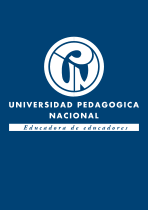El Kant de Heidegger.

Citación
Fecha
2021-06-23Autor
Tillería Aqueveque, Leopoldo
Enlace al recurso
https://revistas.pedagogica.edu.co/index.php/RF/article/view/12234Keyword
CriticismPhilosophy
Imagination
Metaphysics
Time
Crítica
Imaginação
Metafísica
Tempo
Filosofia
Metadatos
Mostrar el registro completo del ítemResumen
Este artículo de reflexión sugiere algunas notas a la crítica que Heidegger hiciera a Kant en su célebre Kant y el problema de la metafísica de 1929. De esta forma, se discuten los alcances de la observación heideggeriana en cuanto a que en la deducción trascendental de su primera crítica, Kant habría retrocedido ante el descubrimiento de la imaginación como fundamento del conocimiento ontológico. Incorporando las recepciones de Žižek, Castoriadis y Martínez Marzoa, se corrobora que el mérito de Heidegger es reconocer que, en la deducción trascendental, Kant habría dudado entre la psicología y la lógica, al no haber visto ninguna tercera alternativa, terminando por descartar su apego a la subjetividad y optando por una versión lógica “al estilo escolástico”. Finalmente, se conjetura que el retroceso del filósofo de Königsberg no fue ante el descubrimiento del fundamento, sino en realidad ante la posibilidad de una interpretación fenomenológica del mundo.
Abstract
This reflection article suggests some notes to Heidegger’s critique of Kant in his famous Kant and the problem of metaphysics of 1929. The scope of Heidegger’s observation is discussed in that in the transcendental deduction of his first critique, Kant would have retreated before the discovery of the imagination as the foundation of ontological knowledge. Incorporating thereceptions of Žižek, Castoriadis and Martínez Marzoa, it is corroborated that Heidegger’s merit is to recognize that in thetranscendental deduction Kant would have hesitated between psychology and logic, having not seen any third alternative,ending up discarding his attachment to subjectivity and opting for a logical version “scholastic style”. Finally, it is conjectured that the retreat of the Königsberg philosopher was not before the discovery of the foundation, but actually in the face of the possibility of a phenomenological interpretation of the world.
Editorial
Editorial Universidad Pedagógica Nacional
Fuente
Colecciones
- Revista Folios [571]
